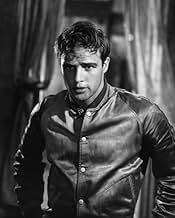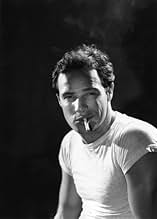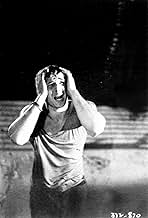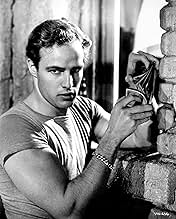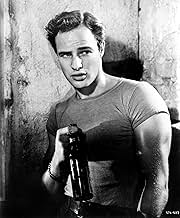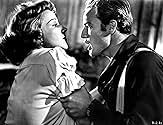Blanche DuBois si trasferisce con sua sorella a New Orleans ed è tormentata dal suo violento cognato mentre la sua realtà si sgretola intorno a lei.Blanche DuBois si trasferisce con sua sorella a New Orleans ed è tormentata dal suo violento cognato mentre la sua realtà si sgretola intorno a lei.Blanche DuBois si trasferisce con sua sorella a New Orleans ed è tormentata dal suo violento cognato mentre la sua realtà si sgretola intorno a lei.
- Vincitore di 4 Oscar
- 18 vittorie e 15 candidature totali
James Adamson
- Extra
- (non citato nei titoli originali)
Irene Allen
- Extra
- (non citato nei titoli originali)
Mel Archer
- Foreman
- (non citato nei titoli originali)
Walter Bacon
- Club Patron
- (non citato nei titoli originali)
Dahn Ben Amotz
- Minor Role
- (non citato nei titoli originali)
Trama
Lo sapevi?
- QuizAs the film progresses, the set of the Kowalski apartment actually gets smaller to heighten the suggestion of Blanche's increasing claustrophobia.
- BlooperWhen Stanley comes back from taking Stella to the hospital, he is looking for a bottle opener. He finds it on the mantelpiece, shakes up a bottle of beer, and opens it. The beer foams up and spills on his trousers. But if you watch at the moment when he swings himself up to sit on the table - before he opens the bottle - you can see that the front of his trousers are already wet. Apparently they re-shot it without him changing into dry trousers.
- Versioni alternativeThe scene in which Blanche and Stanley first meet was edited a bit to take out some of the sexual tension that both had towards each other when the film was first released in 1951. In 1993, this footage was restored in the "Original Director's Version" of the film. The three minutes of newly-added footage sticks out from the rest of the film because Warner Brothers did not bother to restore these extra film elements along with the rest of the movie, leaving them very scratchy due to deterioration.
- ConnessioniEdited into Un Américain nommé Kazan (2018)
- Colonne sonoreIt's Only a Paper Moon
(1933) (uncredited)
Music by Harold Arlen
Lyrics by E.Y. Harburg and Billy Rose
Sung by Vivien Leigh while doing her hair
Recensione in evidenza
"Streetcar Named Desire" is an exceptional film, thanks to three essential components: (1) the superb acting ability of its two leads, Vivien Leigh and Marlon Brando, as well as that of the supporting cast, small in number but huge in its combined dramatic power, (2) an excellent screenplay by the original playwright, Tennessee Williams, that is packed from beginning to end with explosive, conflict driven dialogue, and (3) the brilliant direction of Elia Kazan who so skillfully brings the play to the screen.
In its legendary opening, Blanche DuBois (Vivien Leigh) emerges from a cloud of locomotive smoke and is helped onto a streetcar by a perfect stranger, a sailor. This simple act neatly ties the film's beginning to Blanche's final, heartbreaking line, "I have always depended upon the kindness of strangers". She, as the central character, is lost in the big city, and she becomes more and more hopelessly adrift in the world as the film approaches its very tragic end.
Broke and friendless, Blanche lands in New Orleans where her sister, Stella (Kim Hunter) lives with her coarse, crude husband, Stanley Kowalski (Brando). Having lost her ancestral home on account of family-related debt and having been dismissed under vague circumstances from her position as a high school English teacher in the small Mississippi town from where she came, she has no other place to go at a time of dire need.
Although Stella is genuinely concerned about Blanche's declining physical and mental state, the shabby apartment where she lives with Stanley consists of two small rooms, barely enough space for the Kowalskis even without Stanley's regular poker group, which seems to park itself there at every available opportunity. What makes matters worse is Stanley's loud and boisterous personality. From the start, Stanley resents the presence of Blanche, which he views as an unwanted, disruptive invasion of his marriage and his home. He regards her with total distrust and disdain. Another reviewer here interpreted this as a cultural clash between the old and the new South, and I think that is a very astute observation. In any case, Stanley is totally unsympathetic to Blanche's plight and looks upon her with nothing but suspicion and contempt.
Blanche is trapped in the claustrophobic and confining prison of the dingy Kowalski apartment. For one, fleeting moment, she believes that Mitch (Karl Malden), Stanley's poker buddy and co-worker, stands as her one bright hope of liberation from the walls that continue to close around her, but he turns out to be anything but her desperately needed "knight in shining armor". Tragically, Mitch, a weak individual who is still dominated by a strong mother well into his adulthood, is the last person with the ability to give Blanche the love and strength that she so urgently needs and to whisk her away from the stifling, debilitating atmosphere of the Kowalski dungeon. Blanche's one, last hope for personal redemption soon fades away forever.
I read that, under different circumstances, the lead roles could have been awarded to Olivia de Haviland and John Garfield. As much as I like them both, this would have been a much different movie with them as the leads. Ms. Leigh, a stunning Englishwoman who managed to score two Oscars for playing two iconic, southern American characters, portrays a mentally declining Blanche with great depth and compassion. As to Mr. Brando's brutish and obnoxious Stanley, you've got to see him in action to appreciate his magnificent performance. As in the case of his Terry Malloy in "On the Waterfront", I don't believe that Stanley's most famous lines from this film would be among the most imitated to this day if they weren't delivered so dynamically by Brando in the first place. "Hey, Stel-la!" Sorry. I just couldn't help myself.
While Brando was beaten out of the Oscar by Humphrey Bogart in "African Queen" (not my favorite Bogey movie by a long shot), Leigh, Malden, and Hunter swept the awards for their performances here and deservedly so. The memorable role of feisty neighbor Eunice also launched Pat Hillias's successful career throughout the golden age of television during the 1950's until her tragic and untimely death in 1960.
If you want to watch an unforgettable rendering of a strong, intense script that is worthy of such a talented cast and director, don't miss this one.
In its legendary opening, Blanche DuBois (Vivien Leigh) emerges from a cloud of locomotive smoke and is helped onto a streetcar by a perfect stranger, a sailor. This simple act neatly ties the film's beginning to Blanche's final, heartbreaking line, "I have always depended upon the kindness of strangers". She, as the central character, is lost in the big city, and she becomes more and more hopelessly adrift in the world as the film approaches its very tragic end.
Broke and friendless, Blanche lands in New Orleans where her sister, Stella (Kim Hunter) lives with her coarse, crude husband, Stanley Kowalski (Brando). Having lost her ancestral home on account of family-related debt and having been dismissed under vague circumstances from her position as a high school English teacher in the small Mississippi town from where she came, she has no other place to go at a time of dire need.
Although Stella is genuinely concerned about Blanche's declining physical and mental state, the shabby apartment where she lives with Stanley consists of two small rooms, barely enough space for the Kowalskis even without Stanley's regular poker group, which seems to park itself there at every available opportunity. What makes matters worse is Stanley's loud and boisterous personality. From the start, Stanley resents the presence of Blanche, which he views as an unwanted, disruptive invasion of his marriage and his home. He regards her with total distrust and disdain. Another reviewer here interpreted this as a cultural clash between the old and the new South, and I think that is a very astute observation. In any case, Stanley is totally unsympathetic to Blanche's plight and looks upon her with nothing but suspicion and contempt.
Blanche is trapped in the claustrophobic and confining prison of the dingy Kowalski apartment. For one, fleeting moment, she believes that Mitch (Karl Malden), Stanley's poker buddy and co-worker, stands as her one bright hope of liberation from the walls that continue to close around her, but he turns out to be anything but her desperately needed "knight in shining armor". Tragically, Mitch, a weak individual who is still dominated by a strong mother well into his adulthood, is the last person with the ability to give Blanche the love and strength that she so urgently needs and to whisk her away from the stifling, debilitating atmosphere of the Kowalski dungeon. Blanche's one, last hope for personal redemption soon fades away forever.
I read that, under different circumstances, the lead roles could have been awarded to Olivia de Haviland and John Garfield. As much as I like them both, this would have been a much different movie with them as the leads. Ms. Leigh, a stunning Englishwoman who managed to score two Oscars for playing two iconic, southern American characters, portrays a mentally declining Blanche with great depth and compassion. As to Mr. Brando's brutish and obnoxious Stanley, you've got to see him in action to appreciate his magnificent performance. As in the case of his Terry Malloy in "On the Waterfront", I don't believe that Stanley's most famous lines from this film would be among the most imitated to this day if they weren't delivered so dynamically by Brando in the first place. "Hey, Stel-la!" Sorry. I just couldn't help myself.
While Brando was beaten out of the Oscar by Humphrey Bogart in "African Queen" (not my favorite Bogey movie by a long shot), Leigh, Malden, and Hunter swept the awards for their performances here and deservedly so. The memorable role of feisty neighbor Eunice also launched Pat Hillias's successful career throughout the golden age of television during the 1950's until her tragic and untimely death in 1960.
If you want to watch an unforgettable rendering of a strong, intense script that is worthy of such a talented cast and director, don't miss this one.
- frankwiener
- 14 ago 2016
- Permalink
I più visti
Accedi per valutare e creare un elenco di titoli salvati per ottenere consigli personalizzati
Dettagli
- Data di uscita
- Paese di origine
- Lingue
- Celebre anche come
- Un tranvía llamado Deseo
- Luoghi delle riprese
- New Orleans, Louisiana, Stati Uniti(railway station)
- Aziende produttrici
- Vedi altri crediti dell’azienda su IMDbPro
Botteghino
- Budget
- 1.800.000 USD (previsto)
- Lordo in tutto il mondo
- 53.162 USD
- Tempo di esecuzione2 ore 2 minuti
- Colore
- Proporzioni
- 1.37 : 1
Contribuisci a questa pagina
Suggerisci una modifica o aggiungi i contenuti mancanti

Divario superiore
What was the official certification given to Un tram che si chiama Desiderio (1951) in Japan?
Rispondi






